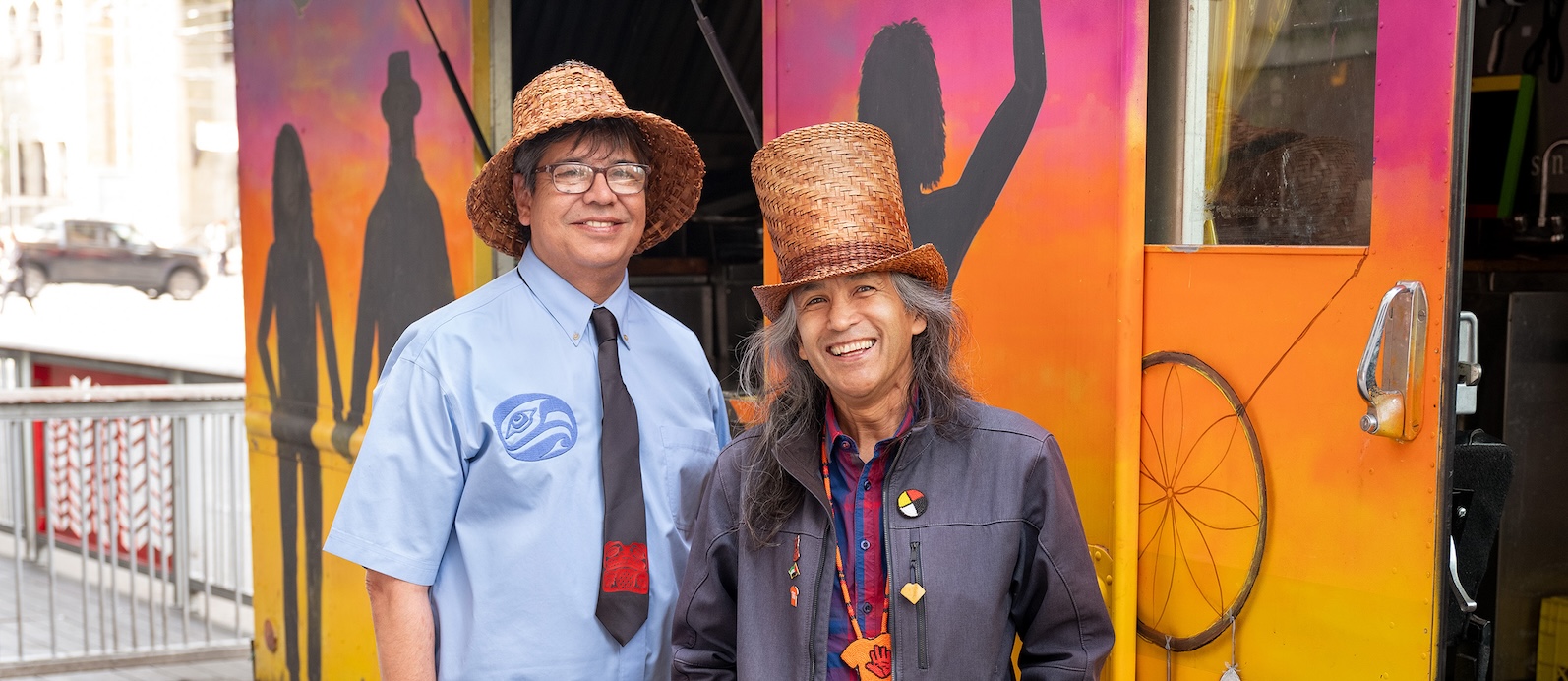
Change Can Happen. Profiles in community leadership: Aboriginal Front Door
Central City Foundation is once again celebrating examples of extraordinary community leadership and innovation from the organizations we walk alongside and support. These individuals and their organizations have demonstrated that change can happen in our community. As part of this celebration, we asked each of our profiled leaders to share their thoughts on leadership, community and hope for a brighter future.
Christopher Livingstone, Board Member, Aboriginal Front Door Society
Norm Leech, Board President, Aboriginal Front Door Society
We are excited to profile the amazing work of Aboriginal Front Door Society. Through tremendous efforts, they have created a welcoming place in the DTES where Indigenous people can go for a time out, access supports and participate in various activities. A culturally safe place, people can connect with traditional Indigenous culture, teachings and ceremonies as part of their healing journey. Aboriginal Front Door is an inspiring example of how hope can thrive in a community where folks are facing tremendously challenging conditions.
Q: How does your organization help address the conditions faced by people in the inner city?
We help people understand that the root causes of the systemic barriers and obstacles to health are part of the colonized systems that have been imposed on people around the world for thousands of years. And that the original traditions and relationships to land and ancestors are a source of healing and health. And that the traumas that people survive also reveal all the amazing gifts and talents needed to survive those traumas. This transformed relationship with trauma helps remove its power over us and helps us to respond rather than react to it. The colonized systems are diabolically brilliant in their comprehensive structural barriers. The default position of the systems is NO. Every non-profit agency in the world exists to help people overcome the barriers and obstacles that are built into colonized systems, whether it is poverty, violence, hunger, discrimination, lack of education, language, housing, health, or whatever. The systems rarely remove any barriers. They would rather underfund non-profits to mitigate the effects of systemic injustices.
Q: How would you describe some of the common lived experiences, systemic inequalities/inequities and other challenges faced by the people you work with?
You name it.
Q: How would you describe the importance of community connections and a sense of acceptance and belonging for the people you work with?
One of the worst outcomes of colonized systems and ways of being is the idea that every person is just an individual, that they are separate from every other person and separate from everything around them. In that universe, everyone is alone. And that explains why the fastest-growing mental health challenge in cities around the world is loneliness and isolation. The Indigenous worldview starts with the knowledge that we are part of everything, that we are related to everything, and that the world around us is filled with All Our Relations. We are never alone.
Q: Looking ahead, can you share with us some of your thoughts about where you see that change can happen?
The more people notice the constant harms and traumas that colonized systems inflict on everyone, the harder it is to simply accept them. Especially when a transformed relationship with that trauma can remove its power and control over our reactions and responses. It opens a pathway to health and wellness and so much more.
Q: What are some examples that give you hope for a better future for the people with who you work?
When people can get out of the reaction phase of triggers and flashbacks and can learn to respond in more productive ways they very quickly wish to help the friends and relatives who need it. The opportunity to help other people is healing medicine in itself. When people realize they have the power to help others and experience that, they are fulfilling one of the primary purposes of an Indigenous way of being. The Indigenous way is to Listen and to Help. Or in a deeper sense, to Notice and to Transform.
Q: How would you describe the value of developing relationships and collaboration in your work and organizations like Central City Foundation?
Invaluable and Immeasurable and Essential and Rewarding.
What has support from Central City Foundation meant for your organization?
Invaluable and Immeasurable and Essential and Rewarding.
Q: Do you have a call to action for our CCF community that you would like to share?
Help us expand, magnify and amplify the conversation about all the deep and profound wisdoms that existed in all the ancient cultures before colonization arrived and imposed itself on the original peoples of the land and disrupted the original relationships with the land. Those first disconnections from the land were the beginnings of all the subsequent traumas of colonization, and they started everywhere else before they got to these lands here. The Indigenous experience here in healing the many traumas due to colonization offers many insights and lessons to help all other peoples heal all of their inter-generational traumas as well.
 Previous story
Previous story
